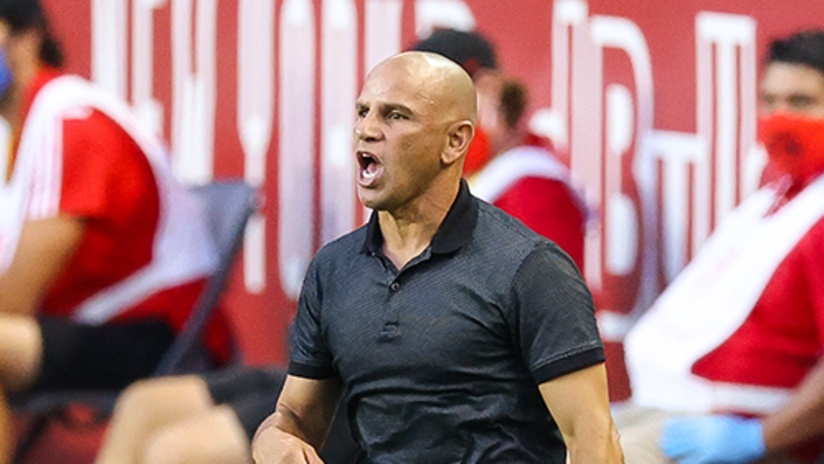Before we dive into the whys and the hows of the New York Red Bulls’ dismissal of Chris Armas and his assistant CJ Brown, a bit of historical context.
Armas was the 15th head coach in the club’s 25-year history across both the RBNY and MetroStars eras. No one in MLS has hired and fired more coaches, and there are some big names on their list, from World Cup winner Carlos Alberto Parreira to once and future greats like Bora Milutinovic, Bob Bradley, Juan Carlos Osorio and Bruce Arena.
Whatever faults can be apportioned to the organization over the years – and there have been a few – being slow to pull the trigger on this front is certainly not one of them.
There are reasons to question the timing of Friday’s decision, mostly due to the fact that the Red Bulls:
- a) remain above the playoff line (and more or less in the top half of the table) in the Eastern Conference despite their current 1-4-1 slump
- b) recently completed two significant signings from abroad, Dru Yearwood and Samuel Tetteh, reinforcements that Armas might’ve deserved some time to work with.
As best we can tell, the main reasons that Armas wasn’t given said time are:
- a) The Red Bulls can’t even finish a sandwich lately; only three teams in MLS have scored fewer than their seven goals in nine matches, none of their strikers have hit the net since the season opener and the club’s leading scorer is currently right back Kyle Duncan, with two goals to his name in 2020.
- b) RBNY simply haven’t looked like “themselves” – meaning the nasty, aggressive, relentless, high-pressing tigers who won the 2015 and 2018 Supporters’ Shields and were respected, however grudgingly, around MLS for being an absolute pain in the neck to play every single time out – for months, maybe even years.
Overall, the data, eye tests and smell tests all line up here. The Red Bulls aren’t inhabiting the area of the standings that they expect to, and they haven’t looked anywhere near their best selves in the process. Based on a brief sampling of online reactions, many of their fans feel that way, too.
“Number one, it's about performance, so, the team playing with a particular identity,” RBNY head of sport Kevin Thelwell told reporters in a Friday conference call. “We wanted the team to perform better in terms of some of the details that we hold as being important to the way in which we play our style of playing. And then, fundamentally, the results. New York Red Bull is a team that needs to be operating, needs to be contesting and competing at the top of the league, and I don't think either the performance or the results are following.
“So in terms of what we want to achieve, the ambitions of the football club going forwards, I had to make a decision about whether we felt Chris and CJ in particular would help us to do that. And unfortunately I didn't feel that was the case. And therefore, it was better to make the change now than to wait further down the line.”
Thelwell arrived from English Premier League climbers Wolverhampton Wanderers just a few months ago, and seems to have quickly come to grips with the DNA of his new club. A word-cloud approach to Friday’s press call shows that he used the terms “results” and “performance” five times each, but alluded to “identity” on a whopping nine occasions.
This is a team that has put the high press at the heart of everything it does and is ever since Jesse Marsch arrived to replace Mike Petke in January 2015 – possibly the most contentious RBNY personnel move of all, and one that we now have to say worked out pretty damn well. Marsch was installed to implement the principles that now guide every outpost in the global Red Bull empire — which notably pushed their flagship club in Leipzig to the semifinals of the UEFA Champions League last month.
Even two years after his departure, Marsch still casts a long shadow over the New York branch of the operation, mostly because he coaxed something close to maximum output out of RBNY and made them a gleefully fulfilled group in the process, a squad that seemed to not merely obey their tactical tasking, but embrace the identity that came with it. Coining the term “energy drink soccer,” Marsch made it feel almost like a lifestyle.
“When I worked with [former RBNY GM] Ali Curtis, when we first came to Red Bull together, he coined a phrase,” Marsch, who now manages Red Bull Salzburg, explained in an Extratime interview back in March. “'If you want something in life, you don’t wait for it, you go out and get it.' And that was the way we described our style of play. I call it going down swinging.”
When Armas took the helm, he expressed a desire to mix in a Plan B, a more possession-oriented alternative to the press that would help the team overcome their painful shortcomings in the postseason and other knockout situations. The idea made sense, but the execution fell short. And what’s worse, it seemed to cloud the clarity and power of Marsch’s full-throttle formulation.
An earnest and respected figure in his own right, Armas was given some rope to seek out his interpretation. Marsch notably declared in that same interview that “one of the beauties about being in the Red Bull system is, there's so much freedom for each coach to use it however he wants, with whatever formation, whatever pressing style.”
But there were too many frustrating matches like Wednesday’s ugly 1-0 home loss to D.C. United, and Thelwell decided it was time to lay down a marker – not only about ambition and output, but the club’s personality as well.














